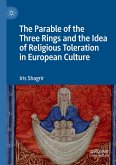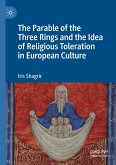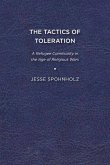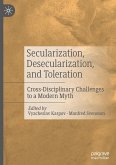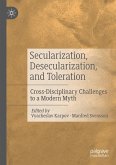Handbook on Religious Toleration in Comparative Perspective
Herausgegeben:Barkey, Karen; Laurence, Jonathan
Handbook on Religious Toleration in Comparative Perspective
Herausgegeben:Barkey, Karen; Laurence, Jonathan
- Gebundenes Buch
- Merkliste
- Auf die Merkliste
- Bewerten Bewerten
- Teilen
- Produkt teilen
- Produkterinnerung
- Produkterinnerung
This Handbook challenges the view--widely held today--that religious toleration is a specifically modern, liberal, and Western concept. To the contrary, it shows that principles of religious coexistence have been articulated since recorded history. As many cultures have recognized across times and places, toleration in some form is a key virtue for enabling peaceful coexistence and human flourishing. Yet owing to its very cross-cultural prevalence, "toleration" has meant many different things in theory and practice. To properly understand it, much less evaluate it, a historical and comparative…mehr
Andere Kunden interessierten sich auch für
![Deus Est Caritas: The Voice of Gabriele Biondo on Personal Justification and Church Reform Deus Est Caritas: The Voice of Gabriele Biondo on Personal Justification and Church Reform]() Vito GuidaDeus Est Caritas: The Voice of Gabriele Biondo on Personal Justification and Church Reform91,99 €
Vito GuidaDeus Est Caritas: The Voice of Gabriele Biondo on Personal Justification and Church Reform91,99 €![Deus Est Caritas: The Voice of Gabriele Biondo on Personal Justification and Church Reform Deus Est Caritas: The Voice of Gabriele Biondo on Personal Justification and Church Reform]() Vito GuidaDeus Est Caritas: The Voice of Gabriele Biondo on Personal Justification and Church Reform91,99 €
Vito GuidaDeus Est Caritas: The Voice of Gabriele Biondo on Personal Justification and Church Reform91,99 €![The Parable of the Three Rings and the Idea of Religious Toleration in European Culture The Parable of the Three Rings and the Idea of Religious Toleration in European Culture]() Iris ShagrirThe Parable of the Three Rings and the Idea of Religious Toleration in European Culture38,99 €
Iris ShagrirThe Parable of the Three Rings and the Idea of Religious Toleration in European Culture38,99 €![The Parable of the Three Rings and the Idea of Religious Toleration in European Culture The Parable of the Three Rings and the Idea of Religious Toleration in European Culture]() Iris ShagrirThe Parable of the Three Rings and the Idea of Religious Toleration in European Culture53,99 €
Iris ShagrirThe Parable of the Three Rings and the Idea of Religious Toleration in European Culture53,99 €![The Tactics of Toleration The Tactics of Toleration]() Jesse SpohnholzThe Tactics of Toleration48,99 €
Jesse SpohnholzThe Tactics of Toleration48,99 €![Secularization, Desecularization, and Toleration Secularization, Desecularization, and Toleration]() Secularization, Desecularization, and Toleration113,99 €
Secularization, Desecularization, and Toleration113,99 €![Secularization, Desecularization, and Toleration Secularization, Desecularization, and Toleration]() Secularization, Desecularization, and Toleration119,99 €
Secularization, Desecularization, and Toleration119,99 €-
-
-
This Handbook challenges the view--widely held today--that religious toleration is a specifically modern, liberal, and Western concept. To the contrary, it shows that principles of religious coexistence have been articulated since recorded history. As many cultures have recognized across times and places, toleration in some form is a key virtue for enabling peaceful coexistence and human flourishing. Yet owing to its very cross-cultural prevalence, "toleration" has meant many different things in theory and practice. To properly understand it, much less evaluate it, a historical and comparative perspective is necessary.
This Handbook provides a foundation for the comparative and historical study of religious toleration. Gathering together primary sources and original analytic essays by leading scholars, it offers the first comprehensive reference work on how toleration has been theorized and practiced across cultures, religions, and historical periods. The primary sources compiled, moreover, span a rich array of genres, including literary works, religious texts, theological, poems and political edicts. Radically shifting the terms of contemporary debates about toleration, this sourcebook provides an indispensable resource to all scholars of religion, comparative politics, and globalization, and to students and teachers alike.
This Handbook provides a foundation for the comparative and historical study of religious toleration. Gathering together primary sources and original analytic essays by leading scholars, it offers the first comprehensive reference work on how toleration has been theorized and practiced across cultures, religions, and historical periods. The primary sources compiled, moreover, span a rich array of genres, including literary works, religious texts, theological, poems and political edicts. Radically shifting the terms of contemporary debates about toleration, this sourcebook provides an indispensable resource to all scholars of religion, comparative politics, and globalization, and to students and teachers alike.
Produktdetails
- Produktdetails
- Verlag: Springer / Springer Nature Switzerland / Springer, Berlin
- Artikelnr. des Verlages: 978-3-031-93897-9
- Seitenzahl: 802
- Erscheinungstermin: Dezember 2025
- Englisch
- Abmessung: 235mm x 155mm
- ISBN-13: 9783031938979
- Artikelnr.: 73890621
- Herstellerkennzeichnung Die Herstellerinformationen sind derzeit nicht verfügbar.
- Verlag: Springer / Springer Nature Switzerland / Springer, Berlin
- Artikelnr. des Verlages: 978-3-031-93897-9
- Seitenzahl: 802
- Erscheinungstermin: Dezember 2025
- Englisch
- Abmessung: 235mm x 155mm
- ISBN-13: 9783031938979
- Artikelnr.: 73890621
- Herstellerkennzeichnung Die Herstellerinformationen sind derzeit nicht verfügbar.
Karen Barkey is the Charles Theodore Kellogg and Bertie K. Hawver Kellogg Chair of Sociology and Religion at Bard College. Her research has focused on empires, toleration and shared sacred spaces. Her book, Empire of Difference (Cambridge UP, 2008), is a comparative study of the flexibility and longevity of imperial systems. It was awarded the 2009 Barrington Moore Award from the Comparative Historical Sociology section at American Sociology Association and the 2009 J. David Greenstone Book Prize from the Politics and History section at the American Political Science Association. Her recent publications include Negotiating Democracy and Religious Pluralism: India, Pakistan and Turkey (Oxford University Press, 2021) and Shared Sacred Sites: A Contemporary Pilgrimage (City University of New York Publications, 2018).
Jonathan Laurence is Director of the Clough Center for the Study of Constitutional Democracy and Professor of Political Science at Boston College. His principal areas of teaching and research have been concerned with the development of religious toleration and state-religion relations in Europe, Turkey and North Africa. Prof. Laurence's latest book is Coping with Defeat: Sunni Islam, Roman Catholicism and the Modern State (Princeton University Press, 2021). Both this work, and his prior book, The Emancipation of Europe's Muslims (Princeton University Press, 2012), were awarded Best Book in Religion and Politics by the American Political Science Association. His first book, Integrating Islam: Political and Religious Challenges in Contemporary France (Brookings 2006, with Justin Vaïsse) was named an Outstanding Academic Title by Choice magazine.
Jonathan Laurence is Director of the Clough Center for the Study of Constitutional Democracy and Professor of Political Science at Boston College. His principal areas of teaching and research have been concerned with the development of religious toleration and state-religion relations in Europe, Turkey and North Africa. Prof. Laurence's latest book is Coping with Defeat: Sunni Islam, Roman Catholicism and the Modern State (Princeton University Press, 2021). Both this work, and his prior book, The Emancipation of Europe's Muslims (Princeton University Press, 2012), were awarded Best Book in Religion and Politics by the American Political Science Association. His first book, Integrating Islam: Political and Religious Challenges in Contemporary France (Brookings 2006, with Justin Vaïsse) was named an Outstanding Academic Title by Choice magazine.
Introduction.- Part I. Thinking Toleration Within Religious Traditions.- Chapter 1 Introduction to Section One: Toleration within Religious Traditions.- Chapter 2 Tolerance and Intolerance in the Hebrew Bible.- Chapter 3 Charitable Jewish Assessments of the Other: 8th-18th Centuries.- Chapter 4 Hasidism.- Chapter 5 Tolerance and Rights: An Exploration of Medieval Canon Law.- Chapter 6 Eastern Orthodox Christianity and Toleration.- Chapter 7 Tolerance in Islamic Thought and Praxis.- Chapter 8 On Pluralism in the Qur'an and Islamic Philosophy.- Chapter 8 The Quran s Address to the Israelites Q. 2:122-152: A New Translation.- Chapter 9 Religious Toleration in Medieval Islamic Thought and Society.- Chapter 10 The Universality of Universal Peace: Central Asian Qalandars and Sulh-i Kull.- Chapter 11 Religious Minorities Rights in Shiite Islam: A Shift from Institutional Discrimination to Absolute Equality.- Chapter 12 May No One Obstruct Them: Tibetan Buddhist Toleration for 18th-Century Capuchin Missionaries in Lhasa.- Chapter 13 A Play on Religious Tolerance in Early India.- Chapter 14 Ingredients of Toleration in Jain Philosophy.- Chapter 15 Beyond Toleration? Syncretism, Amalgamation, and Religious Multiplicity in the Shinto Tradition.- Part II Toleration and the State: Minority, Law and Politics.- Chapter 16 Introduction to Section Two: Toleration and the State: Minority, Law, Politics.- Chapter 17 Asoka s Dhamma: Social Toleration or Communal Harmony.- Chapter 18 Late Roman Toleration? or How to Read an Imperial Edict: Theodosius to All the People on the Catholic Religion.- Chapter 19 Integration or Intolerance? Muslim-Jewish Convergence in the Zirid Kingdom of Granada.- Chapter 20 Two Texts on Toleration from Pre-1500 AD West Africa.- Chapter 21 Half-Toleration: Concordia and the Limits of Dialogue.- Chapter 22 Toleration and the Civil Magistrate in Early Modern Europe, 1517-1598.- Chapter 23 Regarding Toleration and Liberalism: Considerations from the Anglo-Jewish Experience.- Chapter 24 Tolerance and Religious Freedom in Early America.- Chapter 25 Toleration in the Ottoman Empire.- Chapter 26 The Way has not a Constant Name. State Attitudes to Religious Toleration in Chinese History.- Chapter 27 Akbar s Mahabharata: An Indian Epic for the Mughal Emperor.- Chapter 28 Religious Minorities-States Relations in Modern Iran from Safavid Era to the Islamic Republic: Policies and Implications.- Chapter 29 Tolerance and Intolerance in Mexico.- Chapter 30 Post-1998 Indonesia: Ambiguous Stances Towards Toleration Amidst Growing Islamist Majoritarianism.- Part III Toleration and Sacred Space.- Chapter 31 Introduction to Section Three: Toleration & Sacred Spaces.- Chapter 32 Of Roman Bath-Houses, Mosques and Churches: Rabbinic-Jewish Approaches to Religious Spaces of Others.- Chapter 33 The Temple of Parfait Tolerance: an Island of Truce between Conflicting Worlds 13th- 18th Centuries.- Chapter 34 Accommodating Difference and Validating Diversity in Early Modern Europe.- Chapter 35 Toleration as Multiple Construction in the Post-Communist Realm: Dervish Luzha s Tomb in Northern Albania.- Chapter 36 Building Faith and Identity in a Community Bound by History: The Nauroz Festival in Afghanistan.- Part IV Toleration Today: Conflicting Narratives, Competing Rights and New Frontiers of Dialogue.- Chapter 37 Introduction to Section Four: Toleration Today: Conflicting Narratives, Competing Rights, and New Frontiers of Dialogue.- Chapter 38 Religious Toleration and the Enlightenment.- Chapter 39 Tolerance Revisited.- Chapter 40 The Elusive Toleration of Islam in Europe.- Chapter 41 Toleration at the Nexus between Religious Freedom, Pluralism and Democracy: A Focus on the European Court of Human Rights.- Chapter 42 The Concept of Ubuntu in Contemporary Thought.- Chapter 43 Paradoxical Abraham: An Essay on Inter-Monotheistic Hospitality, Dialogue, and Hostility.
Introduction.- Part I. Thinking Toleration Within Religious Traditions.- Chapter 1 Introduction to Section One: Toleration within Religious Traditions.- Chapter 2 Tolerance and Intolerance in the Hebrew Bible.- Chapter 3 Charitable Jewish Assessments of the Other: 8th-18th Centuries.- Chapter 4 Hasidism.- Chapter 5 Tolerance and Rights: An Exploration of Medieval Canon Law.- Chapter 6 Eastern Orthodox Christianity and Toleration.- Chapter 7 Tolerance in Islamic Thought and Praxis.- Chapter 8 On Pluralism in the Qur'an and Islamic Philosophy.- Chapter 8 The Quran s Address to the Israelites Q. 2:122-152: A New Translation.- Chapter 9 Religious Toleration in Medieval Islamic Thought and Society.- Chapter 10 The Universality of Universal Peace: Central Asian Qalandars and Sulh-i Kull.- Chapter 11 Religious Minorities Rights in Shiite Islam: A Shift from Institutional Discrimination to Absolute Equality.- Chapter 12 May No One Obstruct Them: Tibetan Buddhist Toleration for 18th-Century Capuchin Missionaries in Lhasa.- Chapter 13 A Play on Religious Tolerance in Early India.- Chapter 14 Ingredients of Toleration in Jain Philosophy.- Chapter 15 Beyond Toleration? Syncretism, Amalgamation, and Religious Multiplicity in the Shinto Tradition.- Part II Toleration and the State: Minority, Law and Politics.- Chapter 16 Introduction to Section Two: Toleration and the State: Minority, Law, Politics.- Chapter 17 Asoka s Dhamma: Social Toleration or Communal Harmony.- Chapter 18 Late Roman Toleration? or How to Read an Imperial Edict: Theodosius to All the People on the Catholic Religion.- Chapter 19 Integration or Intolerance? Muslim-Jewish Convergence in the Zirid Kingdom of Granada.- Chapter 20 Two Texts on Toleration from Pre-1500 AD West Africa.- Chapter 21 Half-Toleration: Concordia and the Limits of Dialogue.- Chapter 22 Toleration and the Civil Magistrate in Early Modern Europe, 1517-1598.- Chapter 23 Regarding Toleration and Liberalism: Considerations from the Anglo-Jewish Experience.- Chapter 24 Tolerance and Religious Freedom in Early America.- Chapter 25 Toleration in the Ottoman Empire.- Chapter 26 The Way has not a Constant Name. State Attitudes to Religious Toleration in Chinese History.- Chapter 27 Akbar s Mahabharata: An Indian Epic for the Mughal Emperor.- Chapter 28 Religious Minorities-States Relations in Modern Iran from Safavid Era to the Islamic Republic: Policies and Implications.- Chapter 29 Tolerance and Intolerance in Mexico.- Chapter 30 Post-1998 Indonesia: Ambiguous Stances Towards Toleration Amidst Growing Islamist Majoritarianism.- Part III Toleration and Sacred Space.- Chapter 31 Introduction to Section Three: Toleration & Sacred Spaces.- Chapter 32 Of Roman Bath-Houses, Mosques and Churches: Rabbinic-Jewish Approaches to Religious Spaces of Others.- Chapter 33 The Temple of Parfait Tolerance: an Island of Truce between Conflicting Worlds 13th- 18th Centuries.- Chapter 34 Accommodating Difference and Validating Diversity in Early Modern Europe.- Chapter 35 Toleration as Multiple Construction in the Post-Communist Realm: Dervish Luzha s Tomb in Northern Albania.- Chapter 36 Building Faith and Identity in a Community Bound by History: The Nauroz Festival in Afghanistan.- Part IV Toleration Today: Conflicting Narratives, Competing Rights and New Frontiers of Dialogue.- Chapter 37 Introduction to Section Four: Toleration Today: Conflicting Narratives, Competing Rights, and New Frontiers of Dialogue.- Chapter 38 Religious Toleration and the Enlightenment.- Chapter 39 Tolerance Revisited.- Chapter 40 The Elusive Toleration of Islam in Europe.- Chapter 41 Toleration at the Nexus between Religious Freedom, Pluralism and Democracy: A Focus on the European Court of Human Rights.- Chapter 42 The Concept of Ubuntu in Contemporary Thought.- Chapter 43 Paradoxical Abraham: An Essay on Inter-Monotheistic Hospitality, Dialogue, and Hostility.




